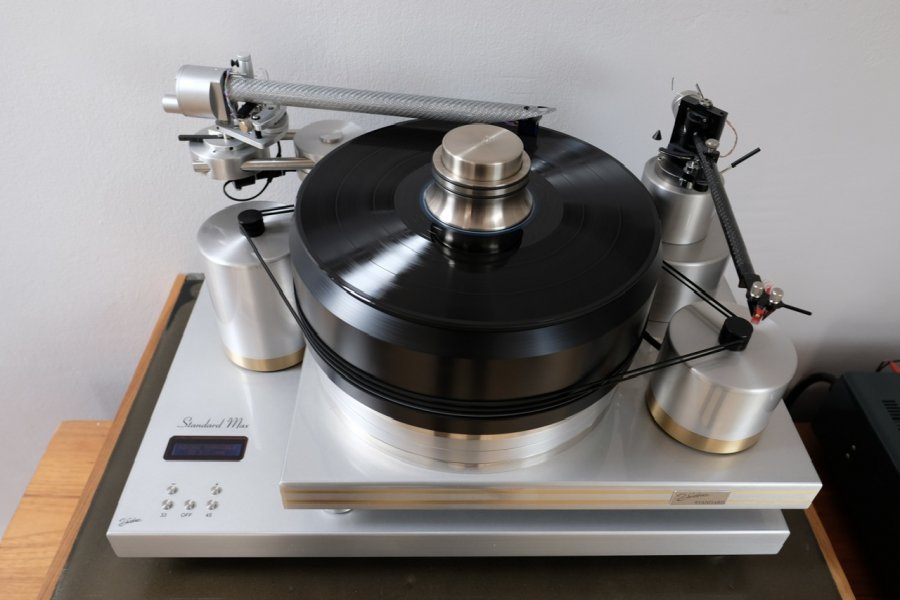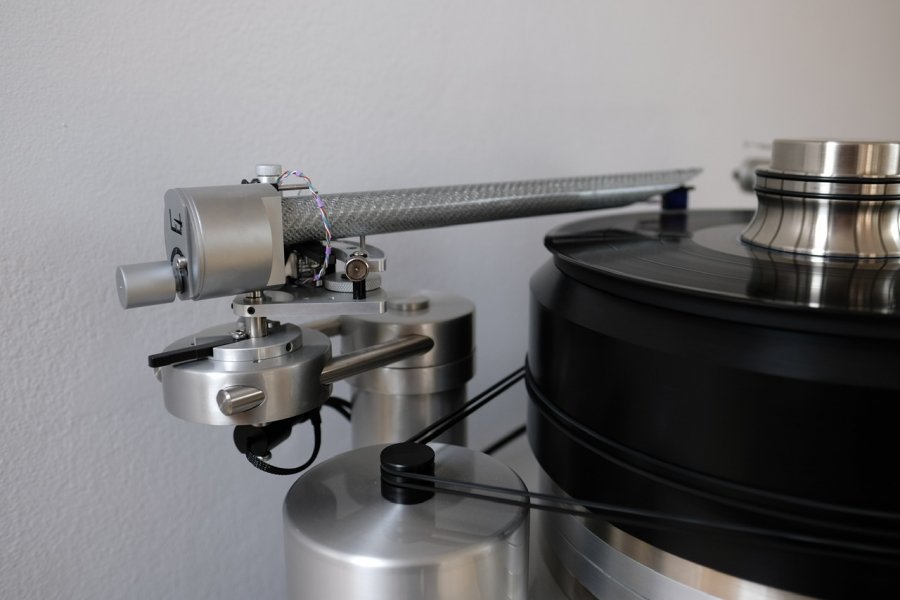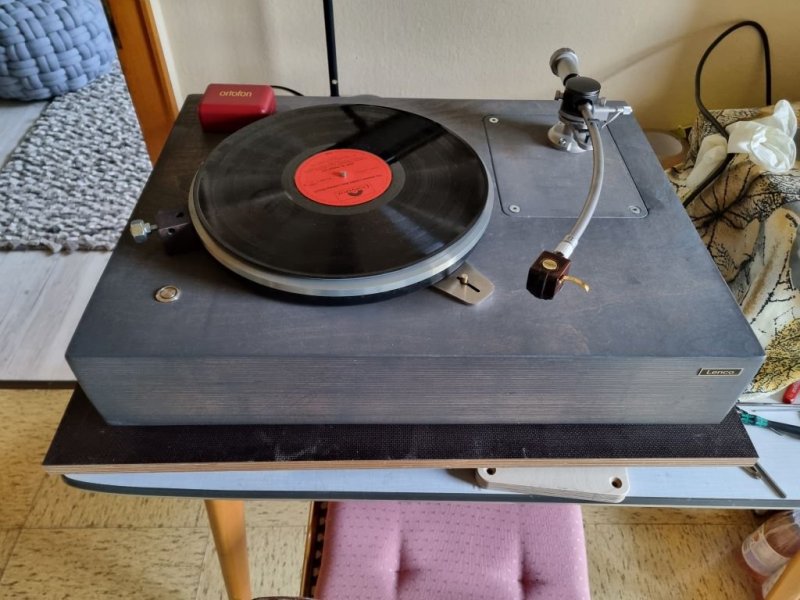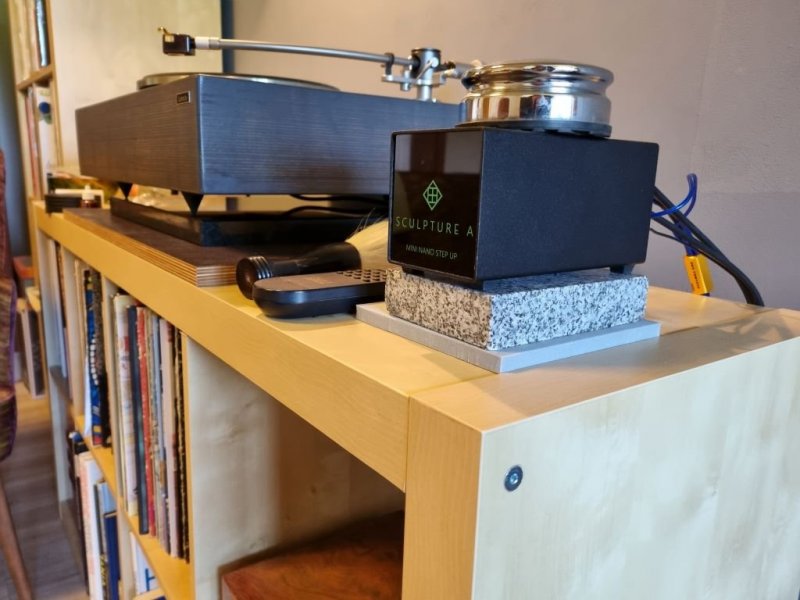What mats are you using there? Looks like some kind of thick cork?Nice!
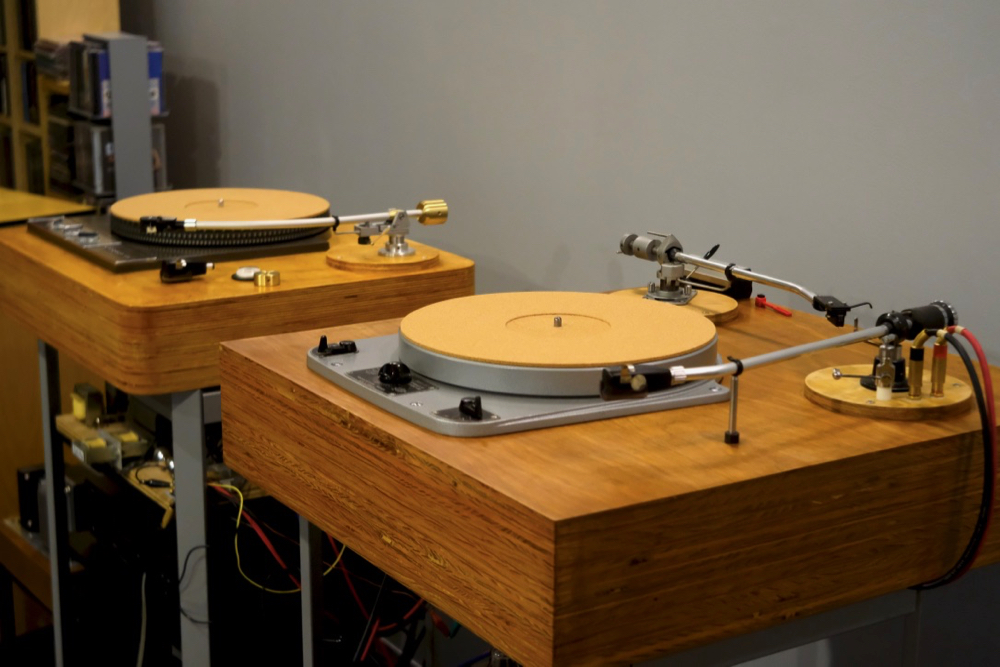
My G301 and 401 are on heavy layered plywood plinths.
But I've also used the G401 plinth-less...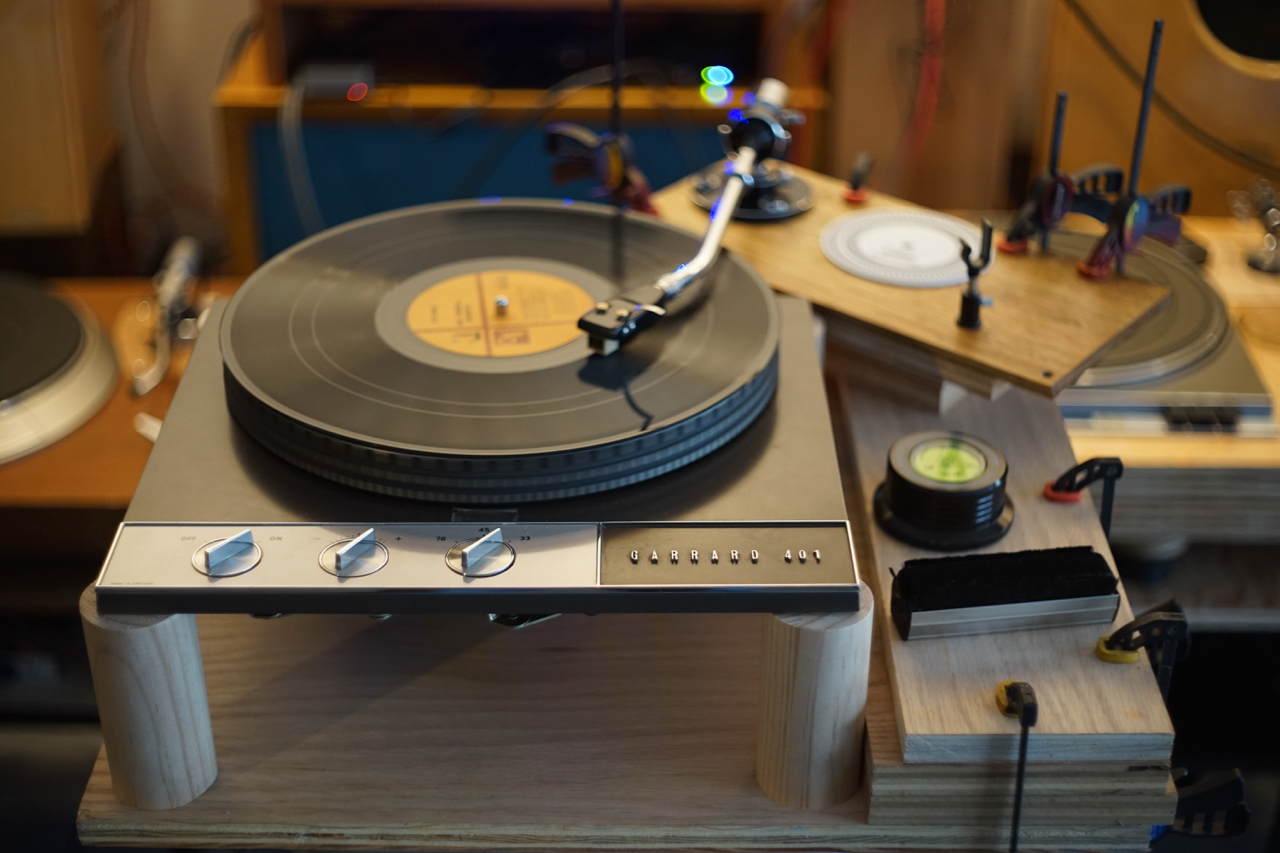
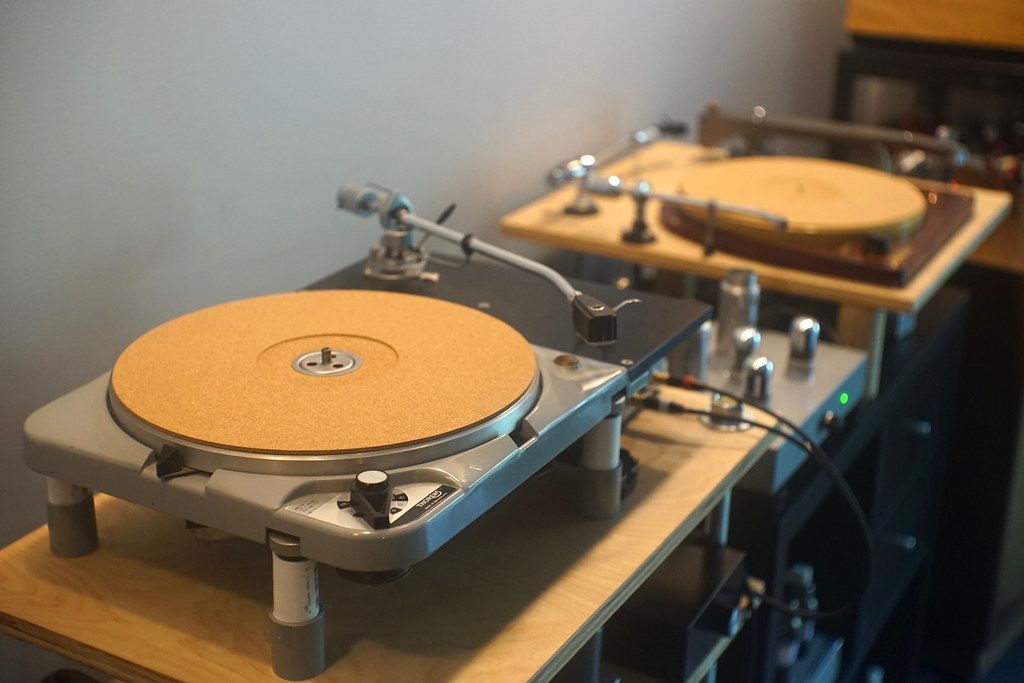
...as well as my TD124.
Assuming that the turntable is adjusted/tweaked for lowest noise, IME, plinth-less (or a lighter plinth) project a more laid back, natural and airy sound albeit with less bass slam. It's a sound quality akin to open baffle speakers and flea power (less than 2Wpc) SE-DHT amps with no negative feedback.
In the end it's about synergizing the rest of the hifi set up to one's taste.
Enjoy the adventure and happy listening!
What turntables do you use? Pictures would be nice as well :-)
- Thread starter XV-1
- Start date
You are using an out of date browser. It may not display this or other websites correctly.
You should upgrade or use an alternative browser.
You should upgrade or use an alternative browser.
Cork mat from Amazon, $12 for a 3-pack.What mats are you using there? Looks like some kind of thick cork?
This is my turntable, a slightly special version of the Sikora - Standard MAX.
I just bought a second tonearm for it, The Wand - Master Series 12” now installed at the back and used with an Etsuro Urushi - Cobalt Blue. The other tonearm is a Davinci Audio Labs - Nobile with a Lyra - Etna.
I just bought a second tonearm for it, The Wand - Master Series 12” now installed at the back and used with an Etsuro Urushi - Cobalt Blue. The other tonearm is a Davinci Audio Labs - Nobile with a Lyra - Etna.
Attachments
Nice looking tableThis is my turntable, a slightly special version of the Sikora - Standard MAX.
I just bought a second tonearm for it, The Wand - Master Series 12” now installed at the back and used with an Etsuro Urushi - Cobalt Blue. The other tonearm is a Davinci Audio Labs - Nobile with a Lyra - Etna.
How does the Standard Max compare to other tables that you've had?
Did you ever try the Sikora tonearm on your Standard Max?
Do you find the Standard Max to be sensitive to what it is sitting on as far as having issues with footfalls or other vibrations?
Best wishes,
Don
Thank you for sharing the link
I was just looking at some of the reviews on Amazon for these. Some of the people were saying that it didn't eliminate static issues for them... that the cork mat would stick to the record when taking the lp off the table. Also, some people said that the cork would shed "cork dust" and it would get into the grooves of the records.
I'm curious if you have noticed anything like the above when using your cork mats?
Best wishes,
Don
Thanks Don,
I remember having talked about Sikora with you earlier and answering your questions. If I remember correct, then you consider the Sikora after experiencing it at a show or something?
This is my first turntable in this quality and price range, so I don’t have any similar turntables to compare with in my own system. I bought the Sikora 4 years ago and I’m very, very happy I did.
No I have not tried the Sikora tonearms, too expensive for me as I used up all my limited budget (compared to what we see here on the site) on the turntable itself.
I remember having talked about Sikora with you earlier and answering your questions. If I remember correct, then you consider the Sikora after experiencing it at a show or something?
This is my first turntable in this quality and price range, so I don’t have any similar turntables to compare with in my own system. I bought the Sikora 4 years ago and I’m very, very happy I did.
No I have not tried the Sikora tonearms, too expensive for me as I used up all my limited budget (compared to what we see here on the site) on the turntable itself.
I haven't encountered cork dust issues after using the mats for almost two years. Curiously, I never encountered the static issue with the G301 and G401 in heavy plinths. It's also not an issue with the TD124 since the cork mat is attached just like the original rubber mat on the light outer platter.Thank you for sharing the link
I was just looking at some of the reviews on Amazon for these. Some of the people were saying that it didn't eliminate static issues for them... that the cork mat would stick to the record when taking the lp off the table. Also, some people said that the cork would shed "cork dust" and it would get into the grooves of the records.
I'm curious if you have noticed anything like the above when using your cork mats?
Best wishes,
Don
Every now and then the mat sticks to an LP with my Japanese idlers mounted on a single layer of 3/4" birch plywood, especially when ambient humidity is low.
Hi MortenB!Thanks Don,
I remember having talked about Sikora with you earlier and answering your questions. If I remember correct, then you consider the Sikora after experiencing it at a show or something?
This is my first turntable in this quality and price range, so I don’t have any similar turntables to compare with in my own system. I bought the Sikora 4 years ago and I’m very, very happy I did.
No I have not tried the Sikora tonearms, too expensive for me as I used up all my limited budget (compared to what we see here on the site) on the turntable itself.
Thank you for your reply! I have to apologize... I've suffered several strokes, so my memory is very much challenged. With that being said, I did think your photos looked somewhat familiar to me
I can certainly understand about having a limited budget for audio gear... hence one of the reasons I have not yet pulled the trigger on a new table/arm yet.
You are right though... My first listening experience with J Sikora was at AXPONA near Chicago this past April and I did indeed come away very much impressed with the owners/developers as well as their products.
Wishing you many wonderful years of enjoyment with your table and arms!
Don
HI je2a3,I haven't encountered cork dust issues after using the mats for almost two years. Curiously, I never encountered the static issue with the G301 and G401 in heavy plinths. It's also not an issue with the TD124 since the cork mat is attached just like the original rubber mat on the light outer platter.
Every now and then the mat sticks to an LP with my Japanese idlers mounted on a single layer of 3/4" birch plywood, especially when ambient humidity is low.
Thank you for your reply. It seems as though you've had good luck with these cork mats. At the low price they are offered at, it certainly would warrant a try at least
I'm sorry if I missed it, but have you noticed how these cork mats may or may not affect the sound when using them vs other mats or no mat at all?
Best wishes,
Don
I experimented a lot with mats back in the 80s when I had 3-pt/suspended belt-drive turntables - a Merrill modified AR + a Thorens TD150. I tried felt, rubber (Platter Matter, AQ Sorbothane, etc.) and then acrylic - SOTA and Sumiko Counterparts with their corresponding reflex clamps. I remember hearing differences in sound but personally, I couldn't definitively say one was better than the other. All I know then as now is, live music sounds infinitely better!HI je2a3,
Thank you for your reply. It seems as though you've had good luck with these cork mats. At the low price they are offered at, it certainly would warrant a try at least
I'm sorry if I missed it, but have you noticed how these cork mats may or may not affect the sound when using them vs other mats or no mat at all?
Best wishes,
Don
Then in the late 80s, I found a TD124-II for $50. Being a classically trained musician, the first thing that struck me was its superior pitch stability over belt drive. In the early 90s, I added a Garrard 301. I've been using these idlers with their stock rubber mats, which have hardened after over two decades. Since original replacement rubber mats for the Garrard and Thorens TD124 are also quite expensive, I tried the 3-pack cork mat. I like what I'm hearing so I keep using them.
Last edited:
Hi Ron,Hi MortenB!
Thank you for your reply! I have to apologize... I've suffered several strokes, so my memory is very much challenged. With that being said, I did think your photos looked somewhat familiar to me.
I can certainly understand about having a limited budget for audio gear... hence one of the reasons I have not yet pulled the trigger on a new table/arm yet.
You are right though... My first listening experience with J Sikora was at AXPONA near Chicago this past April and I did indeed come away very much impressed with the owners/developers as well as their products.
Wishing you many wonderful years of enjoyment with your table and arms!
Don
I’m very sorry to learn about your strokes, but good that you remember experiencing Sikora
It does seem like prices are going up slightly on the Sikora turntables now they have a lot more distribution, sales, shows and a larger production. I paid a bit less 4 years ago compared to the prices we see now. But even if I was buying today a Sikora would be top of my list, I don’t really see any other turntable, where you get the same quality in build and sound for the investment.
If you read Michael Fremers review of the Reference, that is very much what I experience with the Standard Max both when you come to the sound quality, the build quality and for instance how quiete it is, and very well isolated. One can knock quite hard with a fist on the shelf, or even on the lower of the two pliths while a record is playing and you hear nothing through the speakers. I’m still impressed every time I use it. Too me this matters even more, when it’s sort of a once in a lifetime investment.
Last edited:
Hi Don! Well, you asked!View attachment 116345
Very nice slate plinth @Robert. Is this by OMA? Lenco in slate is also one of my fav decks, but mine is much more spartan.
Ordered
The slate is from Jim Cambell. It is from a closely related quarry to the one OMA uses: a bit on the soft side, as slate goes (wouldn’t make good roofing) but that’s what makes it such an amazing plinth. I may have him build me a new one, as this one is just too deep (front to back) for my space. I’d mount the 12” arm on the back and get a few inches off. Amazing table though. I don’t really need the Thorens, but it came from my father in a sorry state, so i was obligated…Very nice slate plinth @Robert. Is this by OMA? Lenco in slate is also one of my fav decks, but mine is much more spartan.
the copper mat and brass speed control knob help it look fancier…both from Sien at SPH, easy to find him on Lenco Heaven. The mat was a huge upgrade. Sien’s bearing in there as well, and an idler wheel from Audio Silente.
nice, thanks for the info! i also use Sien super long bearing, which allows me to mass load the platter with layers of copper/ceramic/duralumin etc. completely transforms the deck into a beastThe slate is from Jim Cambell. It is from a closely related quarry to the one OMA uses: a bit on the soft side, as slate goes (wouldn’t make good roofing) but that’s what makes it such an amazing plinth. I may have him build me a new one, as this one is just too deep (front to back) for my space. I’d mount the 12” arm on the back and get a few inches off. Amazing table though. I don’t really need the Thorens, but it came from my father in a sorry state, so i was obligated…
the copper mat and brass speed control knob help it look fancier…both from Sien at SPH, easy to find him on Lenco Heaven. The mat was a huge upgrade. Sien’s bearing in there as well, and an idler wheel from Audio Silente.
Just a question on the slate for my clarification. Are you finding slate sounds better than granite? I am assuming you have compared and do find it better. They are both natural materials but granite is harder with more structural integrity. So what is it about the softness of slate that appeals sonically to you?The slate is from Jim Cambell. It is from a closely related quarry to the one OMA uses: a bit on the soft side, as slate goes (wouldn’t make good roofing) but that’s what makes it such an amazing plinth. I may have him build me a new one, as this one is just too deep (front to back) for my space. I’d mount the 12” arm on the back and get a few inches off. Amazing table though. I don’t really need the Thorens, but it came from my father in a sorry state, so i was obligated…
the copper mat and brass speed control knob help it look fancier…both from Sien at SPH, easy to find him on Lenco Heaven. The mat was a huge upgrade. Sien’s bearing in there as well, and an idler wheel from Audio Silente.
That's a good question, and one that in the little tiny world of turntable DIY efforts has caused more angry posts than just about anything else. On Lenco Heaven it once rivalled the Tube vs. Solid State flame wars on Audiogon (and elsewhere).Just a question on the slate for my clarification. Are you finding slate sounds better than granite? I am assuming you have compared and do find it better. They are both natural materials but granite is harder with more structural integrity. So what is it about the softness of slate that appeals sonically to you?
So what follows is my pseudo-science-based opinion:
I never tried granite as a plinth as 1) it rings like a bell; 2) it's hard to work; 3) I really don't like the way it looks (and as an architect, I've seen a lot of granite. Sorry, just don't like it, from Absolute Black to Baby-Sh!t spotted tan...not my thing).
So slate? Well, it acts differently than granite. As an anisotrophic material (referring to an object or substance having a physical property that has a different value when measured in different directions. A simple example is wood, which is stronger along the grain than across it), it provides a route for vibrations to move easily only in one direction, which is parallel to the plinth. This is because being formed from sedimentary processes then metamorphized and folded, it is made up of layers that cleave along a weak line of mica deposits (this is what makes harder slates excellent for roof tiles: it splits along one axis into workable shingles), and as vibrations like to travel along the path of least resistance, they move along the cleavage lines but not through it. well, not as much...Anyway, we can't know which direction the vibrations are coming from, whether they are from the motor, the cartridge, air-born, or foot fall. But I like the idea (whether it's real science or my own personal BS) that i can mitigate the vertical movement in the plinth. Horizontal? well i think i'd like to try a Herzan or something like it. Not all slate is the same. Some is very hard (really good for roofs and flooring) and some is soft (good for plinths). Pennsylvania Slate is soft, as is the Italian slate that Stacor uses in their racks.
Now after writing all that, I looked up the spelling of Stacor and found this, which is more succinct than my rambling. But I spent time writing it, so I won't erase it! LOL.
STACORE: “Slate – a natural metamorphic stone with a fine foliated structure. The main building material of our anti-vibration platforms. It has unique damping characteristics due to a combination of high mass, softness, and a fine layered structure. The layered structure, unlike e.g. crystalline structure of granite, efficiently dissipates vibrational energy by the layer-to-layer friction."
So that's one part...the other is that it is beautiful, and that plays not a small part in the overall experience of enjoying music i love...Does it sound "better" than other materials? Not sure. The Slate Lenco is truly spectacular as a full front end, but so is the TD 124 and its wood plinth. And what i most like is that i don't ever find myself thinking about the "sound" of any part of the front end except the cartridge...and that's another problem all its own.
Last edited:
Thank you for your reply and sharing your experience with us! I just ordered a pack of three from the link that you shared....I figure at that low price, it certainly worth a tryI experimented a lot with mats back in the 80s when I had 3-pt/suspended belt-drive turntables - a Merrill modified AR + a Thorens TD150. I tried felt, rubber (Platter Matter, AQ Sorbothane, etc.) and then acrylic - SOTA and Sumiko Counterparts with their corresponding reflex clamps. I remember hearing differences in sound but personally, I couldn't definitively say one was better than the other. All I know then as now is, live music sounds infinitely better!
Then in the late 80s, I found a TD124-II for $50. Being a classically trained musician, the first thing that struck me was its superior pitch stability over belt drive. In the early 90s, I added a Garrard 301. I've been using these idlers with their stock rubber mats, which have hardened after over two decades. Since original replacement rubber mats for the Garrard and Thorens TD124 are also quite expensive, I tried the 3-pack cork mat. I like what I'm hearing so I keep using them.
If nothing else... I'll use on my VPI record cleaning machine as the foam mat there is starting to show it's age.
Thanks again for sharing this with us.
Best wishes,
Don
Hello MortenB,Hi Ron,
I’m very sorry to learn about your strokes, but good that you remember experiencing Sikora
It does seem like prices are going up slightly on the Sikora turntables now they have a lot more distribution, sales, shows and a larger production. I paid a bit less 4 years ago compared to the prices we see now. But even if I was buying today a Sikora would be top of my list, I don’t really see any other turntable, where you get the same quality in build and sound for the investment.
If you read Michael Fremers review of the Reference, that is very much what I experience with the Standard Max both when you come to the sound quality, the build quality and for instance how quiete it is, and very well isolated. One can knock quite hard with a fist on the shelf, or even on the lower of the two pliths while a record is playing and you hear nothing through the speakers. I’m still impressed every time I use it. Too me this matters even more, when it’s sort of a once in a lifetime investment.
Thank you for your additional comments. You certainly know how to ignite excitement in a person!
I completely agree with your statement of being ".... a once in a lifetime investment."
I truly believe that if I decide to pull the trigger on an expensive table/arm combo.... it will certainly be a J Sikora
I am so happy that you have been able to enjoy yours for the last 4 years already! Wishing you great health and the ability to enjoy it for many more years to come
Best wishes,
Don
| Steve Williams Site Founder | Site Owner | Administrator | Ron Resnick Site Owner | Administrator | Julian (The Fixer) Website Build | Marketing Managersing |









